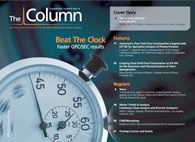Olympic testing
HFL Sport Science (HFL), a part of the LGC Group (Teddington, Middlesex, UK) and one of the world’s largest sports drug surveillance laboratories, is preparing for its role testing the horses competing in equestrian events at the Olympic and Paralympic Games.
HFL Sport Science (HFL), a part of the LGC Group (Teddington, Middlesex, UK) and one of the world’s largest sports drug surveillance laboratories, is preparing for its role testing the horses competing in equestrian events at the Olympic and Paralympic Games.
HFL screens for approximately 2,000 different prohibited substances in each urine or blood sample taken from competing animals. This service is delivered within a Quality System framework that is externally accredited to the ISO 17025 Standard for Testing and Calibration Laboratories. The company has nearly 50 years’ experience in the science of sports doping control, including experience testing within the framework of the World Anti-Doping Agency (WADA) and testing human and animal food supplements for substances prohibited in sport.
Jeremy Cook, managing director of the LGC Health Sciences Division, commented: “We are very proud to be playing a small but important role in the London 2012 Olympic and Paralympic Games. We are confident that our experienced scientists and technology will enable us to meet the exacting standards required for such an important and prestigious event.”
For more information please visit www.lgc.co.uk
This story originally appeared in The Column. Click here to view that issue.

Regulatory Deadlines and Supply Chain Challenges Take Center Stage in Nitrosamine Discussion
April 10th 2025During an LCGC International peer exchange, Aloka Srinivasan, Mayank Bhanti, and Amber Burch discussed the regulatory deadlines and supply chain challenges that come with nitrosamine analysis.










